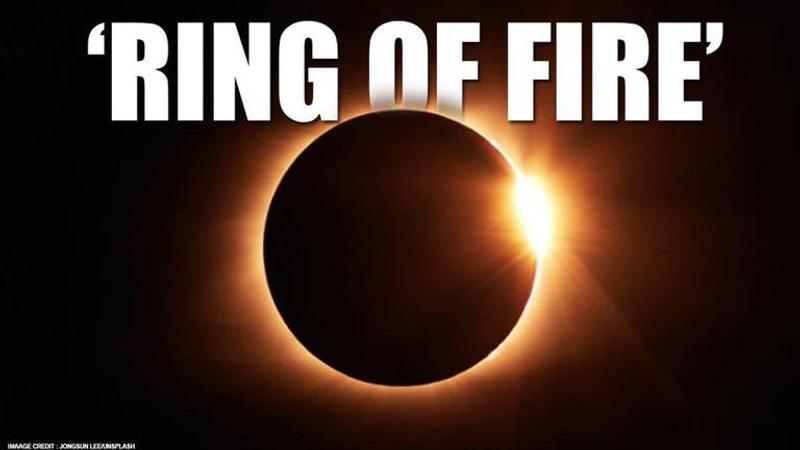Published 17:57 IST, June 10th 2020
Solar Eclipse 2020 to take place on June 21 and will be visible from parts of north India
The photovoltaic Solar Eclipse can be viewed at 9:15 am in India, Pakistan, China, and Africa as the disk of the moon appear to cross in front of the sun.

An annual solar eclipse in 2020 commonly referred to as a Ring of fire, will pass over Africa and Asia on June 21 according to timeanddate.com official celestial events report. Further, a second total solar eclipse will be visible from South America on December 14. The photovoltaic eclipse can be viewed at 9:15 am in India, Pakistan, China, and Africa as the disk of the moon appear to cross in front of the sun, partially near the apogee, the point in sun’s elliptical orbit where it is farthest from Earth, causing the phenomenon known as a Ring of fire, according to NASA.
In the last phase, Solar Eclipse 2020 re-appears around 3:04 pm in Asia which can be viewed via solar filters or the special protective eyewear or eclipse glasses. Basic sunglasses, even those with UV protection, might not be effective in protecting the eyes, as per the Space journal’s reports on guidelines to watch the eclipses.
If you're planning to document the eclipse with any photo equipment, there are special solar filters you can add to make sure the remaining ring of sunlight doesn't take a toll on your vision, SPACE journal wrote.
However, the safest method to view the eclipse would be the traditional pinhole camera. Experts warn that watching towards the sky during an annular eclipse could not only harm the vision but lead to blindness and other forms of permanent eye damage. Therefore, proper eye protection has been recommended in the journal by scientists.
According to the SPACE journal, the partial phase of the eclipse will begin at 8:33 a.m. EST (1333 GMT), however only to the nations around the Pacific or in the Pacific Ocean. At about 2,400 miles (3,900 km) approximately, the eclipse is expected to rise southeast of the Hawaiian Islands. Further, it would proceed towards the coast of Chile at 11 a.m. EST (1600 GMT), just 13 minutes before the moment of maximum eclipse that will be visible to the rest of the countries in the world.
The first place to see the eclipse will be near the southern tip of Budi Lake in the La Araucanía Region of southern Chile, as per journal. However, Río Negro Province of Argentina, near the village of La Lobería would witness the eclipse the last. Officially, the solar eclipse would begin at 1:22 p.m. local time and lasts 2 minutes 7 seconds.
India along the centerline
According to astronomers, the best views of the solar eclipse would be witnessed along the centerline, which stretches from central Africa to northern India, China, and Taiwan. Hence, India can watch one of the clearest celestial "ring of fire" solar eclipse of the year as it falls along the centerline.
(Images: NASA/SPACE Journal)
Updated 17:57 IST, June 10th 2020






